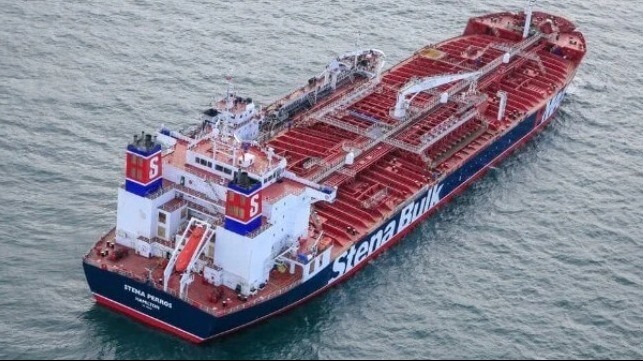Concordia Exploring Converting Product Tankers to Carry Containers

Financially troubled Swedish product tanker operator Concordia Maritime is evaluating the feasibility of converting tankers to operate as containerships in its latest effort to improve performance due to the persistent weak oil markets. Noting that the container segment has shown strong growth in recent years, driven by disruptions to international logistics, Concordia is exploring following the general cargo segment which has already begun using vessels to transport containers.
Concordia Maritime has launched a technical design study working together with Stena Teknik, the technical group owned by its investor Stena Group, as well as a German consulting company specializing in ship design. The project, which is expected to be completed by mid-2022, is investigating the feasibility of converting and adapting Concordia’s 62,5000 dwt P-MAX tankers for container transportation.
The company currently has a fleet of nine of the P-MAX vessels built between 2005 and 2011. They are all currently working on long-term charters. The vessels measure 600 feet in length with a 131-foot beam and are powered by diesel engines. With a design speed of 14.5 knots, they have an operating range of 14,000 nautical miles.
“Despite existing charter agreements, the continued weak tanker market poses challenges for Concordia Maritime,” the company reported in January when they announced the sale of one of the P-MAX vessels. Reflecting the continued low spot market for oil, Concordia noted that the agreed price was below the vessel’s book value and previous valuation. Shortly after the sale was announced, Concordia also reported that it had taken a greater than 10 percent write-down of nearly $30 million on the book value of its tankers as part of an impairment analysis they conduct every six months.
The tanker sale was designed to improve the company’s financial position following a refinancing they completed with Stena in 2021. Announcing the sale in January, they warned that “further sales cannot be ruled out in the future unless we see a rapid recovery in the tanker transport market.”
According to initial assessments, the P-MAX vessels’ two engines, with full redundancy, and other dimensions, Concordia said would make them possible to convert to container vessels. They currently anticipate that they would have a capacity of approximately 2,100 TEU.

that matters most
Get the latest maritime news delivered to your inbox daily.
“It should be stressed that there are a number of technical and market challenges to convert and adapt P-MAX tankers to container ships,” Concordia cautioned in its statement. “There is, therefore, a risk that the study will lead to that the project will not be concluded.”
The current project includes preparation for “basic design” class approval. The ships are currently classed by DNV. If the outcome of the effort supports the conversion, Concordia says it will be followed by discussions with shipyards and possible charterers to explore potential interest. A full conversion is expected to take approximately three to five months.
